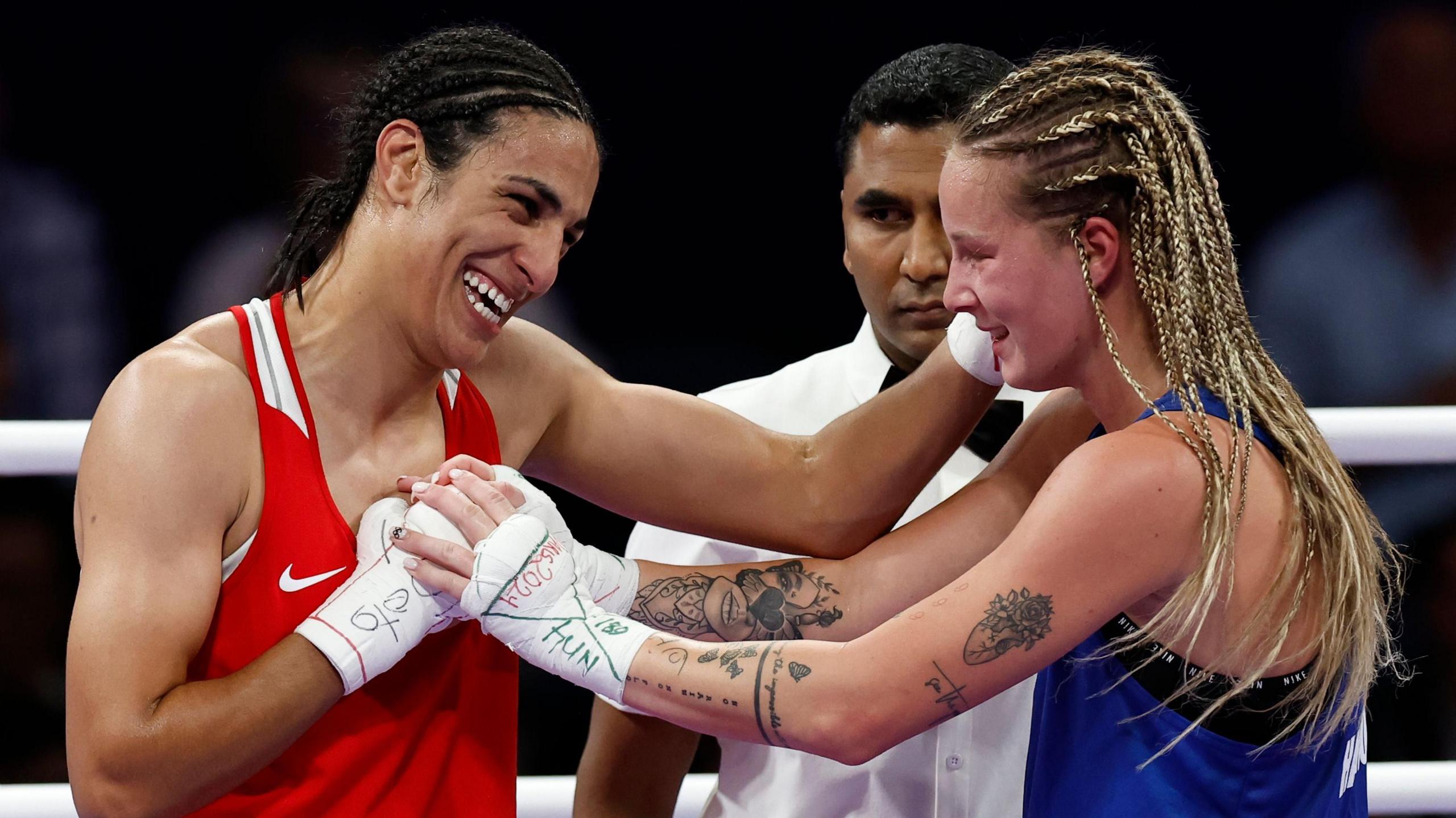Eligibility-row boxer Khelif secures Paris medal
Imane Khelif beats Luca Anna Hamori by unanimous decision
- Published
Boxer Imane Khelif, whose gender eligibility has been called into question, was in tears after guaranteeing a welterweight medal at the Paris Olympics by beating Hungarian Luca Anna Hamori.
The Algerian is one of two boxers competing in Paris despite being banned from last year's World Championships by the International Boxing Association (IBA) after she was reported to have failed gender eligibility tests, a situation which has sparked huge controversy.
The 25-year-old's previous bout lasted just 46 seconds but Khelif, having entered the ring to cheers from loud Algerian support, went the full three rounds on Saturday, winning by unanimous decision.
"I feel good," an emotional Khelif told BBC sports editor Dan Roan.
"It's the first medal in women's boxing in Algeria - I'm very happy. I want to thank all the world and the Arabic world - thank you so much."
Hamori said prior to the fight she did not "think it is fair" Khelif was competing, but the bout was largely fought in good spirits.
The pair shared an embrace after the bell and again after the result was confirmed.
"It was a very hard day for both of us but I just want to say it was a great fight and I wish good luck to Khelif in the future, and thank you so much," Hamori said.
Asked again if she thought the fight was unfair, Hamori, who was booed into the arena, said: "I don't care about it."
Shortly after the fight, Algeria president Abdelmadjid Tebboune posted on social media: "You have honoured Algeria, Algerian women and Algerian boxing. We will stand by your side, whatever your results are. Good luck in the next two rounds and moving forward."
Khelif will meet Janjaem Suwannapheng, who beat favourite Busenaz Surmeneli - the 2021 Olympic champion from Turkey - in the semi-final on Tuesday.
Even if she loses Khelif will leave the Paris Games with a bronze medal.
Boxing controversy - what we know and what we don't
- Published3 August 2024
Bach defends Khelif and Lin competing in Olympics
- Published3 August 2024
Khelif and Taiwan's Lin Yu-ting have been strongly backed amid tense debate by the International Olympic Committee (IOC), who run the boxing competitions at the Games.
IOC president Thomas Bach said earlier on Saturday there was "never any doubt" the pair are women.
Khelif reached the final of last year's World Championships before being disqualified by the IBA - a Russia-led organisation suspended by the IOC in 2019 because of concerns over its finances, governance, ethics, refereeing and judging.
The IBA said Khelif had "failed to meet the eligibility criteria for participating in the women's competition, as set and laid out" in its regulations, while the IOC said the pair had been "suddenly disqualified without any due process".
On Saturday, the IBA said it would hold a news conference on Monday "dedicated to the detailed explanation of the reasons for the disqualification" of Khelif and Lin.

The Hungarian Boxing Association protested against Khelif's participation at Paris 2024 before the fight
'Controversy is a joke'
Yacine Arab, the Algeria National Olympic Committee's sport manager, said the controversy around Khelif has been a "joke".
Some reports have taken the IBA statement that Khelif and Lin have XY chromosomes to speculate they might have differences of sexual development (DSD) like runner Caster Semenya.
Arab denied this. Speaking to the BBC's Roan before Saturday's fight he said: "When she arrived at the village she did this test.
"Do you think if she was positive they would let her fight? Never. She did all the tests - even the tests for pregnancy. All the tests were negative.
"[The IBA] said she was positive and her testosterone is very, very high. Then the medical president of the IOC said that it's really normal in boxing that the athletes' testosterone is high. For all the girls it is the same. Imane is not alone in this case.
"The controversy is a joke. Everyone knows that Imane was born a girl. She has fought all her life as a girl. All the competitions she was a girl. When she was losing nobody talked about this."
Related topics
- Published10 August 2024

- Published26 July 2024

